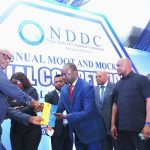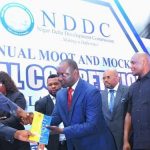The Niger Delta Development Commission has awarded postgraduate scholarships to 600 successful candidates under its 2025/2026 Local Postgraduate Scholarship Programme, reinforcing its commitment to human capital development in the region.
During the award ceremony in Port Harcourt, the Managing Director of the Commission, Dr Samuel Ogbuku, described the initiative as a strategic investment in the region’s future. He said the scholarship scheme is designed to empower young professionals with advanced skills required to address the Niger Delta’s developmental challenges.
Ogbuku, who was joined by other members of the NDDC board, urged the awardees to uphold excellence and serve as ambassadors of the region. He highlighted the success of past beneficiaries, noting that 32 scholars graduated with distinction from Coventry University this year, a testament to the impact of the programme.
He reminded the new scholars of their responsibility, stating that their achievements would contribute to transforming communities back home. “Your education is not just for personal advancement but a beacon of hope for millions who look up to you,” he said.
According to the NDDC Director of Education, Health and Social Services, Dr George Uzowanne, the scholarship attracted 46,240 applicants, with only 600 selected through a transparent electronic examination process. He emphasised that the selection was highly competitive, reflecting the quality of talent in the region.
Dr Angela Chukwudifu noted that the focus on local institutions ensures that scholars remain connected to regional realities while developing expertise in fields such as engineering, environmental sciences, technology, humanities and management sciences. The programme aims to build a skilled workforce capable of solving indigenous challenges.
The best-performing candidate, Reginald Omubo-Pepple, thanked the NDDC for the opportunity and pledged that beneficiaries would contribute their knowledge toward regional development.
For the Niger Delta, this initiative represents more than academic support; it is a deliberate move to empower a new generation equipped to drive sustainable growth, innovation and leadership within the region’s evolving socio-economic landscape.










